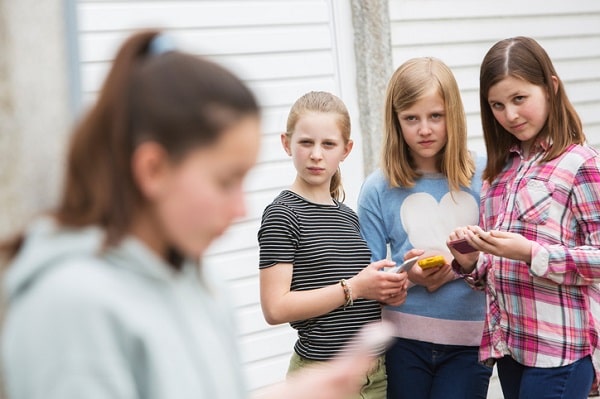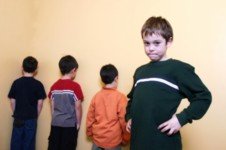Machiavellian kids: Understanding the moral reasoning of bullies
© 2022 Gwen Dewar, Ph.D., all rights reserved

Far from being social oafs, many bullies are confident, popular, and socially-savvy. And then what's missing? Empathy, moral engagement, and a sense of responsibility towards others.
According to an one-time stereotype, people peachy others considering they have poor self-esteem and lack basic social skills. They don't know how to get what they want through negotiation, so they use aggression instead.
Is it truthful?
Maybe — for some individuals. But many bullies — dubbed "pure bullies" past social scientists — opens in a new windoware confident and socially successful. They are pop, and considered "cool" by their peers (Guy et al 2019).
Some bullies may even exist quite skilled at "heed-reading," the power to interpret the emotions, goals, and beliefs of others. They accept a good grasp of social norms. They know what other people desire, like, and expect.
But you tin be a good heed-reader and still be deficient in empathy. You can understand social norms, and all the same feel it'due south acceptable to violate them.
And here, perhaps, is where the average bully comes up brusk.
For case, in a study of over 700 American children, Gianluca Gini and his colleagues establish that bullies, despite existence quite competent at reasoning well-nigh beliefs, outcomes, and the moral permissibility of different actions, were "woefully deficient" in moral pity compared to victims and children who defend victims (Gini et al 2011).
And a study of Italian adolescents reports that boys who bullied were more likely to receive low scores on a test of empathic reactivity (Gini et al 2007).
Worth taking seriously?
I think and so.
Studies propose that some bullies are opens in a new windowmore probable than other kids to develop hating personality disorder, a psychiatric condition characterized past a condone for the rights and feelings of others.
And not surprisingly, many bullies have distinctive attitudes about violence, cruelty, and man nature. Permit'south have a closer look.

How bullies feel about bullying
In a study of Italian and Spanish children, researchers asked 4th and 8th class students to identify the bullies and victims in their classes.
Next, researchers presented each kid with a visual story—told with cartoons—about peer bullying (Menesini et al 2003).
The story included 10 different scenes of bullying. Each scene portrayed an imbalance of power between slap-up and victim. All characters were fatigued with neutral expressions.
During the presentation, researchers asked kids to place with the great:
"If you were this boy or daughter in the story" (pointing to the bully), "would y'all feel (guilty, aback, indifferent, or proud)? Why would you lot feel this way?"
Peer-nominated bullies were more likely to say they would feel pride or indifference.
Bullies were too more egoistic, explaining their emotional responses in terms of the positive consequences for themselves (Menesini et al 2003).
For example, bullies might justify their pride or indifference by proverb
- "I would feel neat because I got the attention of other kids" or
- "I wouldn't feel guilty because information technology was a joke."
How do bullies avoid feelings of shame and guilt?
Perhaps some bullies suffer from a neurological arrears — a brain malfunction that prevents them from feeling or caring about the pain of others (Blair 2007).
But there are other possible explanations.
Peradventure bullies are only good at rationalizing their misconduct.
Moral disengagement

Moral disengagement is the process by which people convince themselves that bad beliefs is morally adequate (Bandura 1991).
Stanford psychologist Albert Bandura has argued that aggressors may "turn off" their sense of guilt or shame by invoking one of several mechanisms of moral disengagement, including
- Blaming or/and dehumanizing the victim
- Displacing or diffusing responsibility (east.g., "He made me practice it")
- Euphemistic labeling, (e.g., "Just a bit of fun")
- Exonerative comparison (eastward.g., "What I did isn't as bad as what others have done")
Do bullies employ such mechanisms? Gianluca Gini tested this idea by asking immature adolescents how strongly they agreed or disagreed with statements like
- "Some kids deserve to be treated like animals," and
- "Kids cannot be blamed for misbehaving if their friends pressured them to do it."
Peer-identified bullies showed the highest levels of agreement. They were joined past kids who regularly helped bullies (by catching or property the victim) and by kids who regularly laughed at victims.
The kids who wereleastlikely to agree with the statements were the defenders — kids whom other students identified every bit regularly continuing up for the victims of bullying (Gini 2006).
Is this a common pattern?
Yes. Links between bullying and moral disengagement accept been documented in many societies — in Europe, E Asia, Australia, and the Due north America (Teng et al 2020; Wang et al 2017; Runions et al 2019; Killer et al 2019).
And in that location'southward more.
Machiavellian reasoning

Mechanisms of moral disengagement permit people to harm others without suffering the pangs of conscience.
But what sensibilities govern the conscience?
In cultures throughout the globe, it's normal for children to develop a sense of right and wrong that is grounded in fairness, kindness, and responsibility towards others.
This moral conscience acts every bit a restraint against taking actions merely because they selfishly rewarding. Y'all can't justify beliefs merely because information technology pleasurable, or furthers your ain self-interests.
But of course people sometimes do attempt to justify their behavior in this fashion, arguing that it's acceptable to violate normal rules of morality as long equally it benefitsthem. As the political philosopher Niccolo Machiavelli infamously wrote, "The end justifies the ways."
Psychologists use the term "Machiavellianism" to refer to an private's tendency to endorse these attitudes, and to exploit and manipulate others for personal gain (Al Aïn et al 2013).
Machiavellian attitudes are very cynical, so yous might not expect them to develop until machismo. But — on the contrary — they are well-documented in kids as young as 9 or 10. How do nosotros know?
Because of researchers like Eleni Andreou. Years ago, Andreou screened 186 unproblematic school children in Greece. She presented the kids with a series of questions about homo nature, and about the acceptability of manipulating people to become what you want.
For case, she asked kids how strongly they agreed or disagreed with statements about the intrinsic goodness of human beings. Examples:
- "Most people are good and kind."
- "Successful people are mostly honest and good."
She as well asked kids to charge per unit their agreement with statements about the acceptability of manipulating other people:
- "Sometimes you lot have to hurt other people to get what you want."
- "Sometimes you have to cheat a little to get what you want."
What did kids say?
It depended — in part — on a child's tendency to bully others.
Kids who were bullies wereless likely to concord with positive statements most human being nature.
And they weremore than likely to embrace the acceptability of harming others, or otherwise engaging in manipulative beliefs (Andreou 2004).
Other studies — in Scotland, Chile, and Germany — have reported the same pattern. Not every kid who endorses Machiavellian beliefs is a bully, but bullies are more than likely to do so (Sutton et al 2000; Allroggen et al 2016; Berger and Caravita 2016; Götz et al 2020).
What can we exercise?
Information technology's hardly news that bullies lack compassion, or that they rationalize their cruelties. But this inquiry tells us something more: that children begin to show these tendencieswhile they are yet in uncomplicated school.
That's troubling, of grade. But it isn't reason to surrender. Research suggests nosotros can help children develop empathic sensation. Read more virtually it in my article, opens in a new window"Instruction empathy: Testify-based tips for fostering empathy in children."
In improver, it's of import to understand that there are at to the lowest degree two different types of bully, and each may do good from a different approach to treatment. For more information, encounter these Parenting Scientific discipline articles
- "Understanding pure bullies: Aggressors who are socially-savvy, pop, and smart"
- When bullies get bullied past others: Agreement "bully-victims"
More than reading about the development of morality
How do children develop their notions of right and wrong? Check out these Parenting Science articles:
- Moral sense: Babies adopt underdogs and do-gooders
- At what practise children brainstorm to tell lies?
- Punitive environments encourage children to tell lies
- Raising helpful kids: Tips for instruction generosity and kindness
- Want to brand kids happy? Help them experience the warm glow of giving
References: Bullies and moral reasoning
Abell Fifty, Qualter P, Brewer Yard, Barlow A, Stylianouc M, Henzid P, and Barrett L. 2015. Why Machiavellianism Matters in Childhood: The Relationship Between Children's Machiavellian Traits and Their Peer Interactions in a Natural Setting. Europe's Journal of Psychology, 11(3): 484-493.
Al Aïn S, Carré A, Fantini-Hauwel C, Baudouin JY, Besche-Richard C. 2013. What is the emotional core of the multidimensional Machiavellian personality trait? Front Psychol. 4:454.
Allroggen M, Back MD, Plener PL. 2016. [Power to the children? – Machiavellianism in children and adolescents]. Z Kinder Jugendpsychiatr Psychother. 44(1):21-nine; quiz 29-30.
Andreou E. 2004. opens in a new windowSlap-up/victim issues and their clan with Machiavellianism and self-efficacy in Greek primary school children. British Journal of Educational Psychology 74: 297-309.
Bandura A. 1991. Social cognitive theory of moral thought and action. In: WM Kurtines and GL Gerwirtz (eds), Handbook of moral beahivor and evolution: Theory, research, and applications. Book 1. Hillsdale, NJ: Erlbaum.
Berger C and Caravita SC. 2016. Why practice early on adolescents bully? Exploring the influence of prestige norms on social and psychological motives to bully. J Adolesc. 46:45-56.
Blair RJR. The amygdale and ventromedial prefrontal cortex in morality and psychopathy. Trends in Cognitive Sciences 11: 387-392.
Gini Thou, Pozzoli T, and Hauser M. 2011. Bullies accept enhanced moral competence to judge relative to victims, just lack moral compassion. Personality and Individual Differences 50(v)603–608.
Gini K. 2006. Social cognition and moral cognition in bullying: What'south wrong? Aggressive Behavior 32:528-539.
Gini G, Albiero P, Benelli B, and Altoè G. 2007. Does empathy predict adolescents' bullying and defending behavior? Aggressive Behavior 33(5):467 – 476.
Guy A, Lee 1000 and Wolke D. 2019. Comparisons Between Adolescent Bullies, Victims, and Great-Victims on Perceived Popularity, Social Affect, and Social Preference. Front Psychiatry. 10:868.
Killer B, Bussey G, Hawes DJ, Hunt C. 2019. A meta-analysis of the human relationship between moral disengagement and bullying roles in youth. Aggress Behav. 45(4):450-462.
Menesini E, Sanchez V, Fonzi A, Ortega R, Costabile A, and Lo Feudo G. 2003. Moral emotions and bully: A cantankerous-national comparison of differences betwixt victims, bullies, and outsiders. Aggressive Behavior 29:515-530.
Obermann ML. 2011. Moral disengagement in self-reported and peer-nominated school bullying. Aggress Behav. 37(2):133-44.
Perren S, Gutzwiller-Helfenfinger E, Malti T, and Hymel S. 2012. Moral reasoning and emotion attributions of adolescent bullies, victims, and bully-victims. Br J Dev Psychol. 30(Pt 4):511-xxx.
Pozzoli T, Gini One thousand, and Vieno A. 2012. Individual and class moral disengagement in bullying amid elementary schoolhouse children. Beset Behav. 38(5):378-88.
Rauthmann JF and Volition T. 2011. Proposing a multidimensional Machiavellianism conceptualization. Social Behavior and Personality.39,: 391–404.
Runions KC, Shaw T, Bussey K, Thornberg R, Salmivalli C, Cross DS. 2019. Moral Detachment of Pure Bullies and Cracking/Victims: Shared and Distinct Mechanisms. J Youth Adolesc. 48(9):1835-1848.
Sourander A, Jensen P, Rönning JA, Elonheimo H, Niemelä S, Helenius H, Kumpulainen K, Piha J, Tamminen T, Moilanen I, and Almqvist F. 2007a. Babyhood bullies and victims and their risk of criminality in late adolescence: the Finnish From a Male child to a Man report. Arch Pediatr Adolesc Med. 161(6):546-52.
Sourander A, Jensen P, Rönning JA, Niemelä S, Helenius H, Sillanmäki Fifty, Kumpulainen One thousand, Piha J, Tamminen T, Moilanen I, and Almqvist F. 2007b. What is the early machismo outcome of boys who peachy or are bullied in babyhood? The Finnish "From a Male child to a Man" written report. Pediatrics. 120(two):397-404.
Sutton J, and Keogh E. 2000. Social competition in school: relationships with bullying, Machiavellianism and personality. Br J Educ Psychol. lxx ( Pt iii):443-56.
Teng Z, Conduct GG, Yang C, Nie Q, Guo C. 2020. Moral detachment and bullying perpetration: A longitudinal written report of the moderating upshot of school climate. Sch Psychol. 35(1):99-109.
Wang C, Ryoo JH, Swearer SM, Turner R, Goldberg TS. 2017. Longitudinal Relationships between Bullying and Moral Disengagement among Adolescents. J Youth Adolesc. 46(6):1304-1317.
Zhang H and Zhao H. 2020. Night personality traits and cyber aggression in adolescents: A chastened arbitration analysis of belief in virtuous humanity and self-control. Kid Youth Serv Rev.119:105565.
Portions of this text derive from an earlier version of the commodity.
Content last modified 6/three/2021
Title image of cyberbullying tween girls by Daisy-Daisy / istock
image of girls bullying in classroom by monkeybusinessimages / istock
image of teenage boys by Tad Denson / istock
hemphilltistonedide73.blogspot.com
Source: https://parentingscience.com/bullies-and-moral-reasoning/
0 Response to "Machiavellian kids: Understanding the moral reasoning of bullies"
Post a Comment